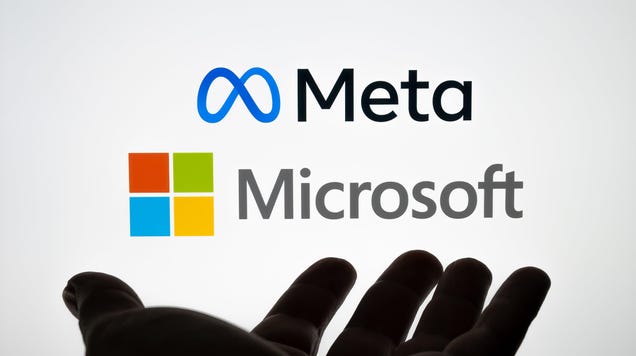As the AI bubble continues to inflate—for better or worse—two titans of the tech industry, Microsoft and Meta, have unveiled the second generation of LLaMA, and they’re giving competitor OpenAI a run for its money by making it open source.
Meta announced the new open-access Llama, which stands for Large Language Model Meta AI, in a blog post today. The corporation explained that letting people peer under the hood of Llama was an important step in making the AI safer, as a “generation of developers and researchers can stress test [it].” Llama 2 is now available for free for research and commercial use—Meta touts that Llama 2 was trained on 40% more data than the first model. Meta also named Microsoft as a preferred partner in Llama 2, with the AI being available with Microsoft’s cloud computing platform Azure.
“An open approach to innovation allows for collaboration, scrutiny & iteration in a way that is especially suited to nascent technologies. And it’s the best way to spread the benefits,” Meta president of Global Affairs wrote on Twitter today. “Giving businesses, startups & researchers access to tools they could never build themselves, backed by computing power they can’t otherwise access, can open up a world of social and economic opportunities.
At the same time, Qualcomm revealed that it was working with Meta to bring Llama to more devices. The telecommunications company said in a press release shared with Gizmodo that Llama 2 would be integrated into smartphones and PCs powered by the Snapdragon CPU beginning in 2024. The partnership would bring the AI out of Meta’s cloud and onto hardware, which can help developers save money on cloud computing while also increasing the reliability of Llama.
“To effectively scale generative AI into the mainstream, AI will need to run on both the cloud and devices at the edge, such as smartphones, laptops, vehicles, and [Internet of Things] devices,” said Qualcomm senior vice president Durga Malladi in the press release.
Meta CEO Mark Zuckerberg unveiled Llama in February as a competitor to OpenAI’s ChatGPT, which has taken the world by storm since it was introduced last autumn. Llama is a chatbot, like ChatGPT, and has been trained on CCNet, C4, Wikipedia, ArXiv, and Stack Exchange according to Meta at the time. As you might predict, it has not been entirely smooth sailing for the Llama, as the AI hype train continues to crash into issues of copyright. Earlier this month, three authors—including comedian Sarah Silverman—sued OpenAI and Meta for allegedly training their respective AIs on copyrighted material, like Silverman’s book The Bedwetter.
